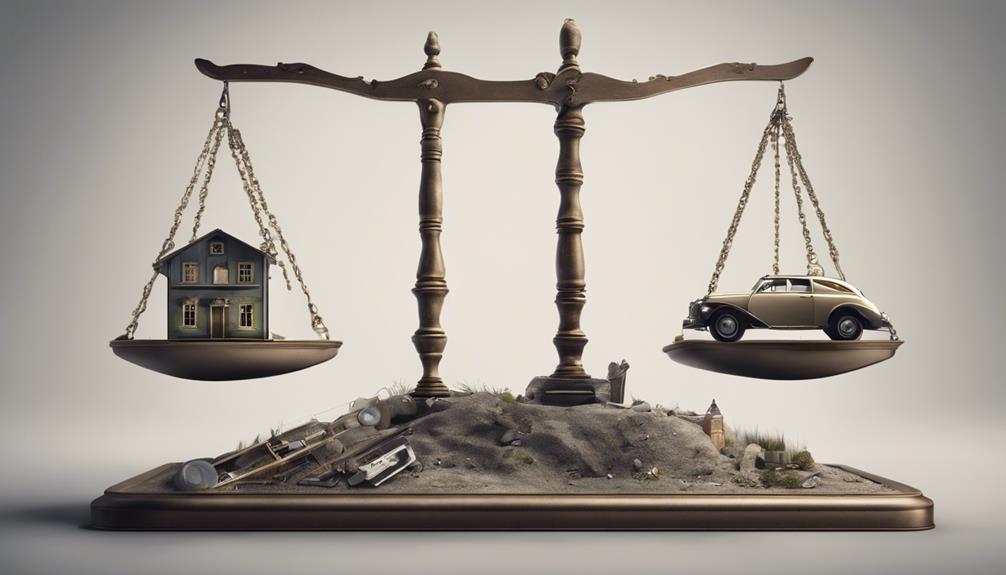Curious about safeguarding your assets while going through a divorce? It’s essential for men confronting this difficult circumstance to grasp the complexities involved in dividing assets.
From property laws to financial transparency, there are key steps to take.
Stay tuned to discover essential advice that can safeguard your financial future and ensure a fair outcome in this critical phase of your life.
Key Takeaways
- Understand state laws on asset division for fair outcomes.
- Clearly differentiate between separate and marital assets.
- Seek guidance from legal, financial, and wealth professionals.
- Avoid asset hiding tactics through transparency and honesty.
Understanding Property Division Laws
Navigating the complexities of property division laws during divorce requires a clear understanding of how assets are categorized and distributed. In most states, including community property states, the goal is equitable distribution of marital assets, aiming for fairness rather than a strict 50/50 split.
It's crucial to grasp the nuances of your state's laws to strategically navigate negotiations. Assets subject to division can range from retirement accounts and investments to real estate and vehicles acquired during the marriage. High-asset divorces, in particular, require careful consideration and expert legal advice to ensure a fair outcome.
Understanding the difference between marital assets and separate property is essential for a successful property division process. With the right knowledge and strategy, individuals can protect their rights and assets effectively during divorce proceedings. Remember, seeking professional guidance can make a significant difference in achieving a favorable resolution.
Differentiating Between Separate and Marital Assets

Understanding the distinction between separate and marital assets is key to safeguarding your financial interests during divorce proceedings. When navigating this complex terrain, consider the following:
- Know the Difference: Separate assets are those acquired before marriage or through inheritance or gift, while marital assets are accumulated during the marriage and are typically subject to division in divorce proceedings.
- Documentation is Vital: Properly documenting the origins of assets is crucial in proving their classification. Without clear evidence, assets may be presumed to be marital, potentially affecting the division process.
- Beware of Commingling: Mixing separate and marital assets can complicate matters. Keep separate assets clearly distinguished to avoid unintended consequences during the division process.
Remember that state laws and court interpretations can influence how assets are classified, making it essential to be well-versed in these factors. By being proactive and strategic in differentiating between separate and marital assets, you can better protect your financial interests throughout the divorce proceedings.
Utilizing Financial and Legal Professionals
Engage with financial and legal professionals to secure expert guidance on asset valuation and protection strategies crucial for navigating divorce proceedings effectively. A divorce lawyer can provide valuable insights into the legal implications of asset division, ensuring a fair outcome.
Collaborating with financial advisors helps in assessing the value of assets and understanding tax implications, optimizing financial outcomes post-divorce. Accountants play a crucial role in addressing financial concerns and planning for a stable financial future.
Wealth management professionals offer guidance on long-term financial planning, ensuring security beyond the divorce process. Estate planning lawyers can assist in updating important documents such as wills, trusts, and beneficiaries to align with the new asset ownership and distribution arrangements.
Additionally, for complex financial situations, involving a forensic accountant can help uncover hidden assets and ensure transparency in asset division. By leveraging the expertise of these professionals, you can navigate the intricate financial and legal aspects of divorce with confidence and strategic foresight.
Avoiding Asset Hiding Tactics

To safeguard your interests and uphold the integrity of your divorce proceedings, it's imperative to be vigilant against tactics aimed at concealing assets. Hiding assets can have serious consequences, impacting property division and potentially leading to legal penalties.
Here are key considerations to help you navigate this challenging aspect of divorce:
- Consult a Family Law Attorney: Seeking legal advice is crucial in understanding your rights and obligations regarding asset disclosure and fair settlement negotiations.
- Transparency in Financial Matters: Maintaining openness about your financial situation is essential. Courts value honesty, and full disclosure can lead to a more favorable outcome in asset division.
- Avoiding Asset Hiding: Engage in good faith negotiations and refrain from hiding assets. Working towards a fair and transparent process won't only benefit you legally but also ensure a smoother transition post-divorce.
Planning for Long-Term Financial Security
Let's ensure our long-term financial security by developing a comprehensive budget plan that accounts for both current and future expenses, including child support and alimony payments. Consulting with a financial advisor during the divorce process can provide valuable insights into your financial standing and help you plan for long-term stability. A financial advisor or accountant can assist in navigating the complexities of asset division, ensuring a fair outcome. Treat the divorce as a business negotiation, prioritizing financial transparency to protect your interests and avoid negative repercussions. Maintaining open communication and avoiding drastic financial decisions without guidance are crucial steps towards safeguarding your financial well-being. By creating a detailed budget plan and seeking professional consultation, you can establish a solid foundation for your long-term financial security post-divorce.
| Financial Advisor | Asset Division | Budget Plan |
|---|---|---|
| Expert Guidance | Equitable Outcome | Comprehensive |
| Financial Health | Fair Division | Future Expenses |
| Long-term Stability | Transparency | Child Support |
Frequently Asked Questions
What Should a Man Do Before Getting a Divorce?
Before getting a divorce, we should:
- Gather all financial documents
- Evaluate assets
- Consult professionals
- Create a realistic budget
- Update estate plans
These steps will help us understand our financial situation, protect our assets, and plan for the future.
How Can a Man Protect His Assets in a Divorce?
When going through a divorce, it's crucial to safeguard assets by disclosing all financial holdings and being transparent to avoid penalties.
Consider a prenuptial agreement for assets acquired pre-marriage. Seek advice from a financial advisor to create a protection plan.
Maintain meticulous records of all financial activities to strengthen your case. Partner with a skilled family law attorney to guide you through asset division and secure your financial future.
How Should a Man Protect Himself in a Divorce?
We can protect ourselves in a divorce by securing our financial records and assets. It's crucial to hire experts like forensic accountants to uncover hidden assets.
Safeguarding personal property before initiating divorce proceedings is essential. Legal representation well-versed in men's rights and asset protection is a must.
Seeking expert advice during asset division ensures post-divorce financial stability. By taking these proactive steps, we can navigate the divorce process with confidence and protect our assets effectively.
How Do I Protect Myself Financially in a Divorce?
To protect ourselves financially in a divorce, we must first educate ourselves on the state's property division laws. Consulting a financial advisor is crucial for assessing asset values and planning for post-divorce financial stability.
Gathering and documenting all financial information ensures transparency and accuracy during negotiations. It's essential to consider tax implications with guidance from a tax accountant and prioritize long-term financial security over impulsive decisions.
Conclusion
We understand that going through a divorce can be emotionally and financially challenging.
While it may be tempting to try to hide assets or avoid tough conversations, it's crucial to prioritize transparency and seek professional guidance.
By facing these difficult decisions head-on and planning for the long-term, you can ensure a more stable future for yourself.
Remember, it's okay to ask for help and prioritize your well-being during this process.










